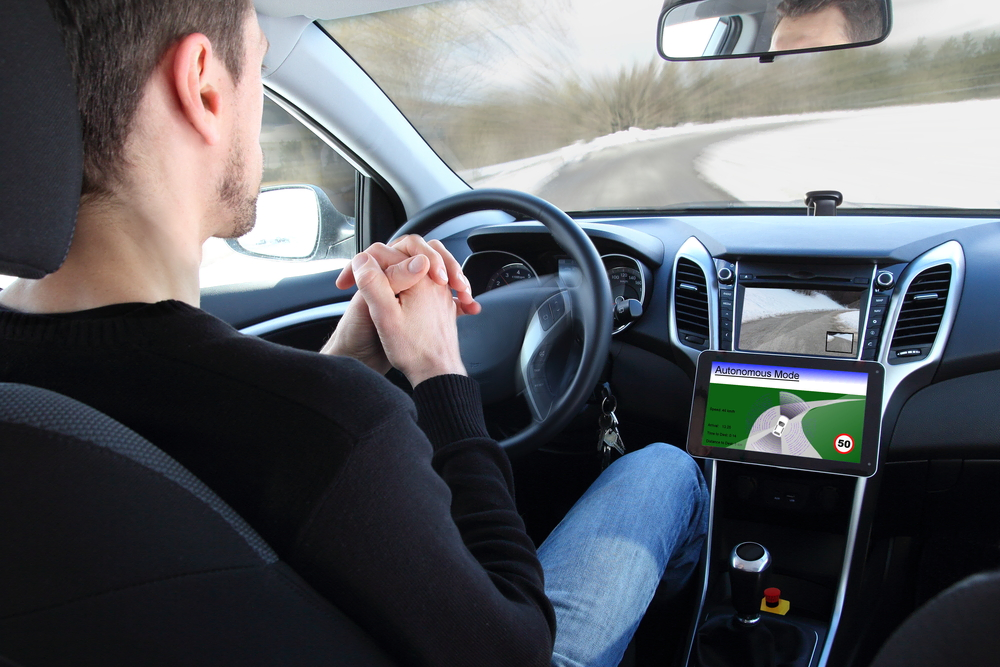
The future is almost here. It may soon get to the point where Georgians might see a vehicle with passengers in the backseat and no one behind the wheel and not be freaked out about it. What will that mean in terms of car insurance costs?
It’s a good question with lots of variables in the answer. Let’s start with a basic definition.
A self-driving car is also known as an autonomous vehicle, or AV. AVs are continuously being tested on roads in Arizona and elsewhere. Cars called robotaxis (talk about the future!) are in partial operation on a trial basis in one U.S. location. Fleets of autonomous 18-wheelers are also being cautiously tested.
The technology isn’t ready for prime time yet, but there’s no doubt that there will come a time when they’re available for sale, legally driving on the road, and a common sight throughout the country.
What will that mean for the cost of car insurance? Will it go up or down? That’s not an easy calculation, but here are a few of the leading factors that will determine the direction car insurance policies are likely to go when AVs are common and driverless vehicles are riding the highways and byways of the very near future in Atlanta, Augusta, and Americus alike.
The Higher Cost of AVs Equals Higher Premiums in Georgia
There’s a simple reason why it costs more to insure Ferraris than Fords. Ferraris cost more to replace or repair, so insurance companies have to pay more in claims if the sportier vehicle is stolen or damaged.
It’s likely to be the same with AVs, at least when they first come onto the market. They’ll cost more than traditional vehicles. Probably a whole lot more. So for that reason alone, it’s likely that car insurance premiums on them will be higher than what you’re used to paying for coverage.
Robots Drive Better Than You …
The “driver” of an AV is artificial intelligence, or AI. That’s a computerized system that uses sensors, software, machine learning, satellites, and other technologies to safely navigate and drive a vehicle. If you want to describe the technology using sexier language, it’s a robot chauffeuring you and the kids in your car.
It’s a robot with lightning reflexes that obeys all speed limits. It never gets tired, drinks, or takes illegal substances. It never experiences road rage or makes bad decisions based on out-of-control emotions. Theoretically, the robot powering the AV is flawless behind the wheel.
That’s got to lower the cost of insurance, right? The technology should radically reduce the risk of collision and deaths on the road. Since insurance companies will have fewer claims, they’ll be able to pass the saving along to all of us.

… Except When They Don’t
New technologies always have a few bugs. Think about your hulking, expensive, and oh-so-slow first computer. How often did it crash?
That was annoying. But when a first-generation AV crashes, we mean it literally. It crashes. It makes poor decisions for reasons related to algorithms rather than emotions.
Sometimes robot drivers tragically kill people.
Besides the human tragedy of such events, there are a lot of insurance decisions to be made. Who’s at fault when a car powered by AI causes an accident? Certainly not the driver, because … there is no driver.
Will AV owners get sued, even though the collision isn’t their fault? The government must have a voice in making that determination. Will laws be written and procedures put in place to assign financial blame when AVs get into accidents? If not, will car insurers react with costly premiums to protect their bottom line?
Will You Need Car Insurance in Georgia If You Don’t Own a Car?
It’s possible that the high cost of AVs will never actually come down. Maybe the vehicle (and insurance rates) will be so high that the average person only pays for the service of being transported in an AV rather than ever owning the vehicle. Maybe AVs will mostly be used for rideshare duty.
In that case, car insurance providers might not sell policies to individual vehicle owners at all. Maybe their primary customers will be corporate AV fleet owners. The immense buying power of companies buying insurance for thousands of vehicles at a time might bring the cost of coverage down.
Or … maybe the cost of car insurance stays high, and the corporate fleets pass that cost along to riders in Georgia and elsewhere. If that’s the case, will you opt for an AV ride when you need it, or instead continue to lease or buy conventional cars with humans behind the wheel? Will you have the choice? What if a time comes when AVs are the only accepted transportation on the roads?
Decision Time Might (or Might Not) Be Sooner Than You Think
Some analysts are predicting that the first AVs will hit the market as early as 2026 (though that’s looking rather optimistic). Whenever the sight of driverless cars on Georgia roads does become a common sight, you won’t have to make an immediate decision on your AV car insurance.
It’s unlikely that the average driver will be able to afford the first AVs, to say nothing of the cost of insuring the purchase. As a result, it will still be some time before most vehicles on the roads of America — and the Peach State — will be piloted by robots.